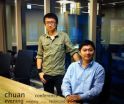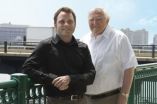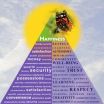Recycling: A new source of indispensible 'rare earth' materials mined mainly in China
2011-06-30
(Press-News.org) That axiom of sustainability — "recycle and reuse" — could help ease concerns about a reliable supply of substances, indispensible for a modern technological society, that are produced almost exclusively in the Peoples' Republic of China. That's the conclusion of a study on these so-called "rare earth" elements in the ACS journal Environmental Science & Technology.
Xiaoyue Du and Thomas E. Graedel note that the dozen-plus rare earth elements (REEs) have unique physical and chemical properties making them essential for defense applications, computers, cell phones, electric vehicles, batteries, appliances, fertilizers, liquid crystal displays, and other products. But there is growing concern about the supply, since only one country, China, is the major source. "Since 1990, China has played a dominant role in REE mining production; other countries are almost completely dependent on imports from China with respect to rare earth resources," the researchers state.
To determine how much recycling potential of the REEs from in-use products could add to the supply, they did the first analysis of the amount of REEs available in products in the United States, Japan, and China. Those countries are the major uses of REEs. The analysis concluded that nearly 99,000 tons REEs were included in products in 2007. This invisible stock, equivalent to more than 10 years of production, "suggests that REE recycling may have the potential to offset a significant part of REE virgin extraction in the future...and minimize the environmental challenges present in REE mining and processing," the report notes.
INFORMATION: END
ELSE PRESS RELEASES FROM THIS DATE:
2011-06-30
Scientists are reporting development and successful testing of a rapid and accurate test to tell the difference between bacterial and viral infections. Those common afflictions often have similar symptoms but vastly different treatments — antibiotics work for bacterial infections but not for viruses. The report appears in ACS' journal Analytical Chemistry.
Robert Marks, Daria Prilutsky, and colleagues cite the importance of determining the source of an infection in order to quickly start the right treatment. If left untreated until results of a throat culture, for instance, ...
2011-06-30
How people choose to consume resources and use contraception influences their responses to climate change, according to a team of psychologists.
Janet K. Swim, professor of psychology, Penn State, and her colleagues report that growing consumption and growing population are two significant contributors to human impact on the environment. Both substantially increase carbon dioxide levels in the atmosphere, the researchers report in a special issue of American Psychologist that focuses on how psychology contributes to understanding and addressing global climate change.
"Engaging ...
2011-06-30
An emerging field of science termed "isoscapes" is making it possible to pinpoint the geographical origins of illegal drugs, trafficked endangered animals, dismembered human body parts at crime scenes, and even pricey scotch whiskey and cheese, according to an article in the current edition of Chemical & Engineering News (C&EN), the American Chemical Society's weekly newsmagazine.
In the article, Sarah Everts, C&EN European correspondent, explains how isoscapes has even led to development of one of the newest and most unusual maps of the world. It is a map showing the ...
2011-06-30
WASHINGTON, June 29, 2011 — Imagine a new genre of tiny implantable sensors, airborne and stationary surveillance cameras and sensors and other devices that operate without batteries on energy collected from the motion of a heart beat and have wireless communications capability. And the power plant for those devices is a "nanogenerator" that could even produce energy to charge an iPod from the movements of a person walking down the street.
That's the topic of a new episode in the American Chemical Society's (ACS) award-winning "Global Challenges/Chemistry Solutions" podcast ...
2011-06-30
NEW BRUNSWICK, N.J. – One-third of immigrant children and more than 70 percent of foreign-born, nonelderly adults living in New Jersey five years or less lack health coverage, a Rutgers statewide survey finds.
The report, "Health, Coverage and Access to Care of New Jersey Immigrants," by the Rutgers Center for State Health Policy (CSHP), also concludes immigrants face significant access-to-care barriers and their lack of health insurance is a much larger problem than for New Jerseyans born in the United States.
The research describes the health profile, insurance status ...
2011-06-30
A team of North Carolina State University researchers has discovered more about how a gene connected to the production of new brain cells in adults does its job. Their findings could pave the way to new therapies for brain injury or disease.
Most areas of the brain do not generate new brain cells, or neurons, after we are born. One exception is the olfactory bulb, the brain's scent processor, which continually produces new neurons. Dr. Troy Ghashghaei, assistant professor of neurobiology, had previously found a gene – known as Foxj1–connected to the production of an area ...
2011-06-30
DURHAM, N.C. -- So much for tagging photographs with names, locations and activities yourself – a new cell phone application can take care of that for you.
The system works by taking advantage of the multiple sensors on a mobile phone, as well as those of other mobile phones in the vicinity.
Dubbed TagSense, the new app was developed by students from Duke University and the University of South Carolina (USC) and unveiled at the ninth Association for Computing Machinery's International Conference on Mobile Systems, Applications and Services (MobiSys), being held in ...
2011-06-30
In 2009, the American Society of Civil Engineers (ASCE) assigned the grade "D" to the overall quality of infrastructure in the U.S. and said that ongoing evaluation and maintenance of structures was one of five key areas necessary for improving that grade. Since that time, federal stimulus funds have made it possible for communities to repair some infrastructure, but the field of high-tech, affordable methods for the continual monitoring of structures remains in its infancy. Instead, most evaluation of bridges, dams, schools and other structures is still done by visual ...
2011-06-30
CHESTNUT HILL, MA (June 29, 2011) – American artist Jackson Pollock's paintings often clashed with the rules of the art world. But they couldn't defy the laws of physics, according to a multidisciplinary team of researchers from Boston College and Harvard who give quantitative form to Pollock's methods and genius in the latest edition of the journal Physics Today.
Quantitative analysis is a phrase few would associate with Pollock, the abstract expressionist who during the 1940s and 50s adopted the method of pouring paint onto canvas in order to convey his artistic vision ...
2011-06-30
CHAMPAIGN, Ill. — In 1943, American psychologist Abraham Maslow proposed that all humans seek to fulfill a hierarchy of needs, which he represented with a pyramid. The pyramid's base, which he believed must come first, signified basic needs (for food, sleep and sex, for example). Safety and security came next, in Maslow's view, then love and belonging, then esteem and, finally, at the pyramid's peak, a quality he called
"self-actualization." Maslow wrote that people who have these needs fulfilled should be happier than those who don't.
In a new study, researchers at ...
LAST 30 PRESS RELEASES:
[Press-News.org] Recycling: A new source of indispensible 'rare earth' materials mined mainly in China


